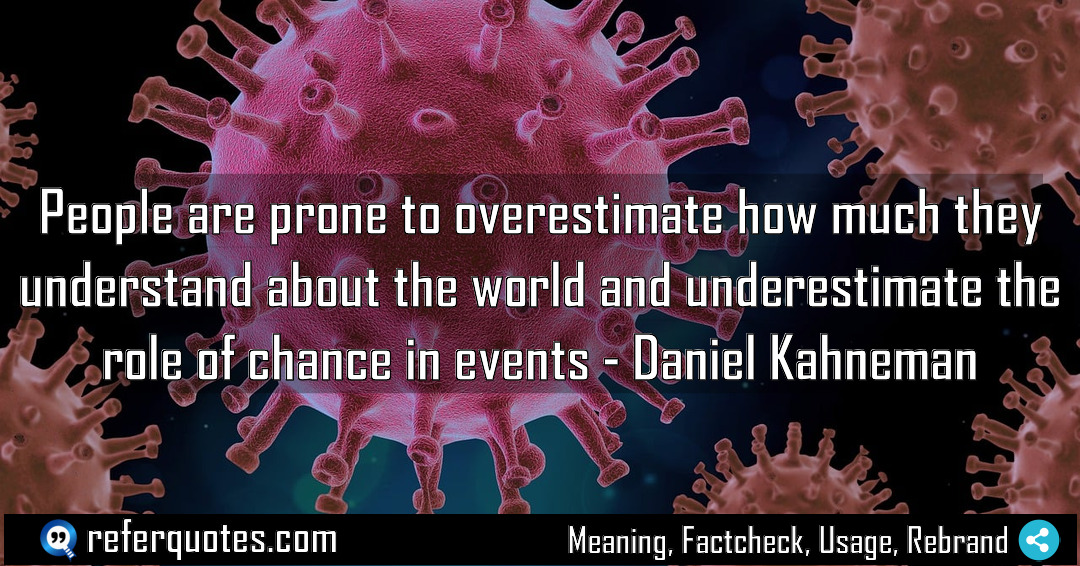People are prone to overestimate how much they understand… it’s one of those truths that, once you see it, you can’t unsee. It explains so much about why our best-laid plans often go sideways and why we’re so often surprised by the world.
Share Image Quote:Table of Contents
Meaning
At its core, this quote is about two fundamental human blindspots: our unjustified confidence in our own knowledge and our complete disregard for the sheer randomness of life.
Explanation
Let me break this down from my own experience. The first part, the overestimation… that’s what we call the Illusion of Explanatory Depth. You think you know how a bicycle works until you have to draw it with all its chains and gears. We do this with everything—the economy, a complex project at work, why a relationship failed. We build a simple, coherent story in our heads and mistake that story for deep understanding.
And the second part, underestimating chance… oh, this is the killer. We are story-telling machines. We can’t stand the idea that something just… happened. So we weave a narrative. The startup succeeded because of the founder’s brilliant, prescient vision. Maybe. Or maybe they were just in the right place at the right time and got lucky. We ignore the role of luck because it’s messy and it undermines our sense of control. It’s the narrative fallacy in full swing.
Quote Summary
| Context | Attributes |
|---|---|
| Original Language | English (3668) |
| Category | Education (260) |
| Topics | bias (25), chance (2), uncertainty (21) |
| Literary Style | analytical (121) |
| Emotion / Mood | reflective (382) |
| Overall Quote Score | 80 (256) |
Origin & Factcheck
This wisdom comes straight from Daniel Kahneman’s 2011 magnum opus, Thinking, Fast and Slow. It’s a cornerstone of his life’s work in behavioral economics, for which he won the Nobel Prize. You’ll sometimes see similar sentiments floating around, but this specific phrasing is pure Kahneman, born from decades of rigorous research, not just anecdotal observation.
Attribution Summary
| Context | Attributes |
|---|---|
| Author | Daniel Kahneman (54) |
| Source Type | Book (4032) |
| Source/Book Name | Thinking, Fast and Slow (54) |
| Origin Timeperiod | 21st Century (1892) |
| Original Language | English (3668) |
| Authenticity | Verified (4032) |
Author Bio
Dr Daniel Kahneman transformed how we think about thinking. Trained in Israel and at UC Berkeley, he built a career spanning Hebrew University, UBC, UC Berkeley, and Princeton. His partnership with Amos Tversky produced prospect theory and the heuristics-and-biases program, culminating in the Nobel Prize in Economic Sciences. He engaged broad audiences through bestselling books and practical frameworks for better decisions. He continued writing and advising late into life, leaving ideas that shape economics, policy, medicine, and management. If you want to dive deeper, start with the Dr Daniel Kahneman book list and explore his enduring insights.
| Official Website
Where is this quotation located?
| Quotation | People are prone to overestimate how much they understand about the world and underestimate the role of chance in events |
| Book Details | Publication Year: 2011; ISBN: 9780374275631; Latest Edition: Farrar, Straus and Giroux, 2013; Number of pages: 499. |
| Where is it? | Part III: Overconfidence, Chapter 21: The Illusion of Validity, Approximate page 207 (2013 edition) |
